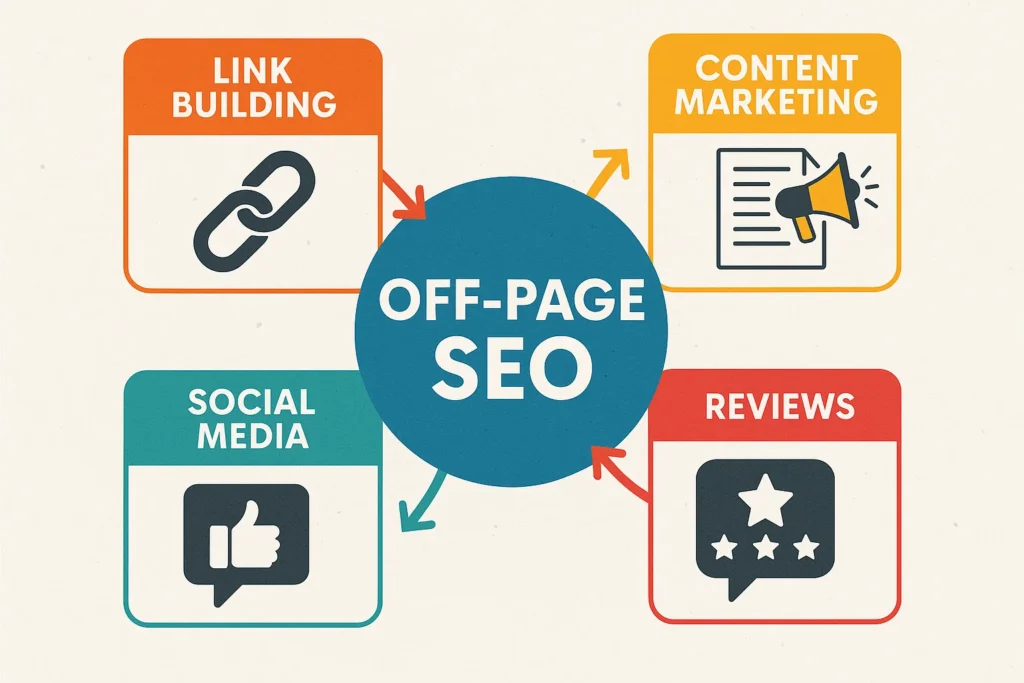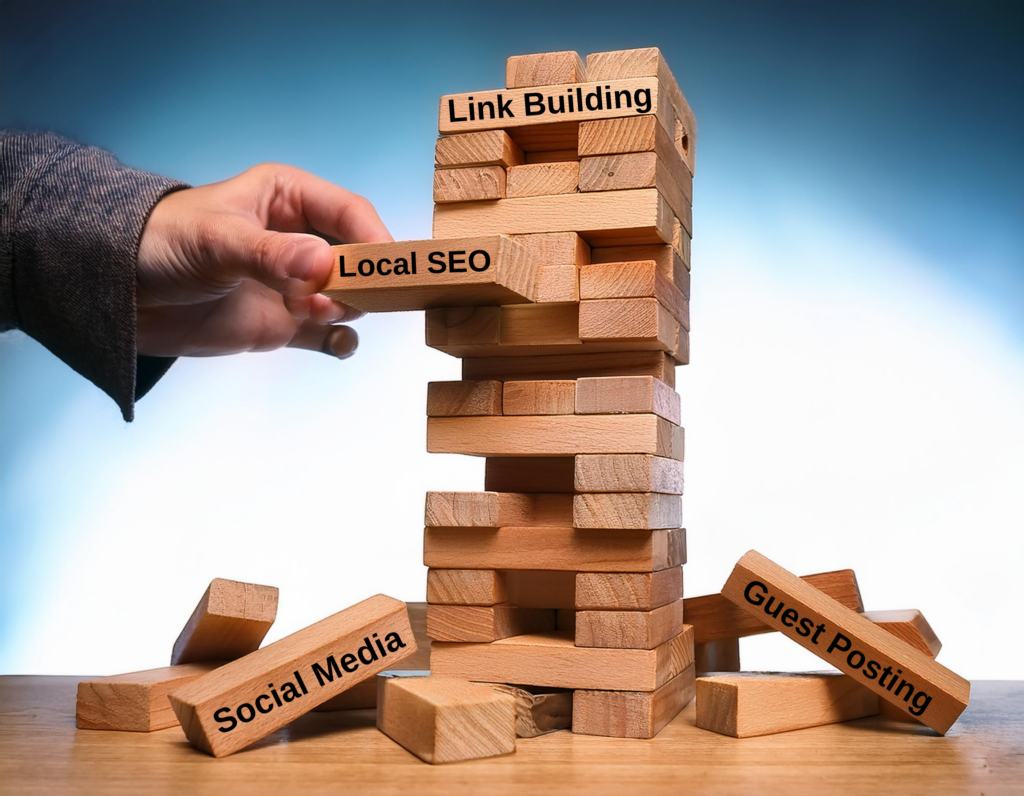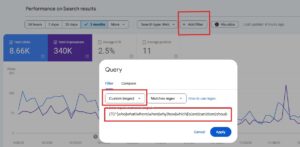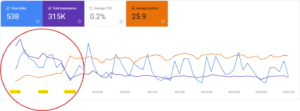The domain authority of your website is one of the most important factors Google considers when ranking it. Because of this, building your website’s credibility should be at the top of your list when looking to increase your positioning in search engine results pages (SERPs).
Off-page SEO is a vital part of any digital marketing strategy and is the third tier in what we consider the three C’s of SEO—code, content, and connections. Building this type of strategy can be daunting, which is why we put together this comprehensive guide to off-page SEO.
What Is Off-Page SEO?

Off-page SEO refers to ranking factors outside of your website—namely, links from other websites that lead back to yours. This can include backlinks from high-quality referring domains, social media, and even local citations when applicable.
For the most part, however, when we’re talking about off-page SEO, we’re typically referring to link building. This is the process of acquiring backlinks from other domains outside of yours for the purpose of increasing traffic to your site.
Off-Page SEO Key Terms
If you want to build an effective off-page SEO strategy for your website, there are a few key terms you’ll first need to know:
- Linking Domain/Referring Domain: These terms refer to the domain that is linking back to your website. Moz defines these as linking domains, while SEMrush defines these as referring domains. These terms are interchangeable, and you’ll likely see both when developing an off-page SEO strategy.
- Backlink: Backlinks appear on referring domains and direct users back to your site when clicked. While the number of backlinks that refer back to your site is important, Google only counts it once as a referring domain—even if you have more than one backlink on that site.
- Domain Authority (DA)/Authority Score (AS): This is a metric used to determine the credibility of a website. Sites are given a score from one to 100, which is determined by several factors, including organic traffic quality, the number of linking domains your site has, and the power of the backlinks coming from those domains. Moz calls this metric Domain Authority (DA), while SEMrush calls it Authority Score (AS). The higher the score is, the more credible your site is in the eyes of search engines.
5 Types of Off-Page SEO
Generally, link building is what is first thought of when talking about off-page SEO. However, there are other types of off-page SEO to be aware of, as all can play a role in increasing your site’s DA score. These can include the following:
1. Link Building
Link building involves outreach to other websites in hopes of that site placing your link directly into their content and generating a backlink for you. Backlinks that come from domains with higher authority (i.e. a higher DA score) can significantly improve the way search engines view and rank you.
2. Broken Link Building
In this instance, you would need to scour other sites for broken links and then convince the publisher of those sites to replace the broken links with your own. This is especially useful if the other site was previously linking to a competitor of yours, and you’re looking to surpass them by having the publisher link to you instead.
3. Guest Posting
Guest posting also involves outreach. In this instance, you wouldn’t just be providing a link; you would also be providing the content to place on another site. Basically, you’d write the content, and another site would publish it for you, providing a link back to you.
4. Social Media Marketing
There is a huge connection between social media and SEO. Links from social media profiles that refer back to your site are considered another type of off-page SEO. While this traffic is labeled as the “social” default channel grouping in Google Analytics, it still refers back to you, and posting on social media with links back to your website can be a successful strategy—especially for product-based B2C businesses.
While social media may not directly impact your rankings in search results, it can attract more attention to your brand, grow your audience, and increase engagement.
5. Local SEO
Local SEO encompasses several things and involves optimizing your brand’s local presence to increase visibility, traffic, and brand awareness. Typically, this involves continuously managing and updating your Google Business Profile and getting your business’s name to appear in local citations and online listings (i.e. business directories, review sites, social profiles, etc.).
Benefits of Off-Page SEO
Off-page SEO has many benefits. However, it can be challenging to see these benefits right away because it is a long-term investment. Many brands may not see immediate results and even give up on any off-page SEO efforts made.
It’s important to understand the benefits of off-page SEO before deciding to call it quits. SEO is a long game, and not everything will happen all at once right away.
Off-page SEO can increase your domain authority over time and improve your rankings in SERPs. This is because search engines will improve a site’s rankings when they see that it’s popular and authoritative. While this may take some time, the end results are always worth it.
For example, you’ll see below that it takes a good amount of time for a tactic like backlinking to work its magic. We have acquired backlinks for this client since March 2021, and you can see the steady growth over time the longer the client invested in off-page SEO. As the number of the site’s referring domains increased, we were able to see steady growth in the DA score:

Brand mentions and valuable referral traffic increase your brand’s visibility. When this is paired with a digital footprint that extends beyond what your competitors are doing, you will see great results from an off-page SEO strategy.
Best Practices for an Effective Off-Page SEO Strategy
There are various components of an off-page SEO strategy, each providing unique advantages. Having a well-rounded off-page SEO strategy can significantly enhance your website’s visibility, credibility, and authority.
Below are some of the best practices to enhance your off-page SEO strategy:
Publish Great Content
If you want other sites to link back to yours, it’s a no-brainer that you’ll need quality content to link to. One way to measure the effectiveness of your content is with E-E-A-T, an acronym that means Experience, Expertise, Authority, and Trustworthiness. Basically, if your content hits all three marks here, you are more likely to gain the attention (and links) of others.
To write engaging website content, you’ll need to provide research-backed information in an engaging and concise manner. Beyond implementing important SEO tactics (keywords, internal linking, header structure, etc.), you should write for your reader and provide a strong call to action. This type of website copy is more likely to convert and more likely to be picked up by other websites.
Differentiate Quality vs. Quantity
When it comes to building backlinks, it’s important to focus on quality over quantity. A few high-quality backlinks from reputable sites can have a greater impact than numerous low-quality links.
As a rule of thumb, we aim to acquire backlinks from sites with higher DA scores than that of the client’s site. While these links can sometimes be more challenging to obtain, they are far more beneficial in the long run for boosting authority.
Additionally, as mentioned above, Google focuses on the number of referring domains rather than the number of backlinks, making it that much more important to acquire high-quality links from reputable sites rather than a lot of links all at once from the same low-quality referring domain.
Use the Right Anchor Text
Anchor text is the clickable text on the referring domain that links back to you. Using the right anchor text is essential for both user experience and SEO. Correctly using anchor text can improve the relevance of your backlinks, signaling to Google that your site has exactly what the user is looking for.
Here are some tips for using anchor text effectively:
- Be Descriptive: The anchor text should give a clear idea of what the linked content is about so users understand what to expect when they click the link.
- Use Keywords: Incorporate keywords into your anchor text, but avoid over-optimization The keyword you use should correlate with the content on the page being linked back to. For example, if we were backlinking to the article “9 Tips to Help You SEO Optimize Your Blog Posts,” you could consider anchor text like “SEO optimization tips for blog posts,” “blog SEO optimization tips,” or other similar keywords.
- Avoid Generic Anchor Text: In general, it’s best to avoid using phrases like “click here” or “read more” in your anchor text. These phrases are too broad and not descriptive enough to tell Google what you’re linking to. They do not provide context to search engines about the linked page’s content. Instead, aim for more informative phrases that accurately describe what you’re linking to.
Avoid Keyword Stuffing
Keyword stuffing is the practice of putting too many keywords on one page in an attempt to boost your site’s ranking. Overusing keywords looks spammy and can even discourage users from interacting with your page since it can affect the readability of your content and make it sound unnatural.
Limit keyword usage to only one to two times per page, or four to five times for every thousand words. Additionally, instead of repeating the same keyword multiple times, try using synonyms and related terms to switch it up and make the piece flow nicely.
Do you want to increase your website’s authority and rankings? Consider reaching out to our experts at Rank Fuse. We have experience building effective off-page SEO strategies. Contact us today to learn more.




